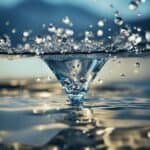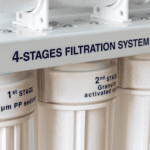We’ve all been there. That bewildering moment when you’ve just finished washing your car, and it looks worse than before you started. Is it the soap? The sponge? Or, perhaps, could the villain be something as unsuspecting as the water itself?
Why Hard Water is a Problem
Hard water, packed with minerals like calcium and magnesium, doesn’t exactly spell disaster for washing cars. But it’s certainly not your ally. Imagine laboriously scrubbing away only to be rewarded with streaky, dull, and unsatisfactory results. It’s not your fault, it’s the water’s.
The Science of Hard Water
Understanding why hard water poses a problem requires a quick dive into science. Hard water carries minerals that, upon evaporation, leave behind a stubborn residue. And guess what? Your shiny car ends up wearing that residue like an uninvited guest.
Let’s delve deeper.
- Calcium and Magnesium: These two are the chief culprits in hard water. Once they dry on your car’s surface, they form those unwanted white streaks and spots.
- Lather Inefficiency: Hard water is notorious for reducing soap’s lather capability. So, you end up using more soap and, inevitably, wasting more resources.

How to Determine Hard Water
The question remains: how can you identify if your water is hard?
Signs of Hard Water
There are a few signs you can look out for:
- Soap’s Battle: If your soap is having trouble lathering, you might be dealing with hard water.
- The Aftermath: If you notice white spots or streaks on your car after washing and drying, hard water could be the cause.
Related: How Much Does It Cost to Rent a Water Softener?
Testing for Hard Water
To confirm your suspicions, you can use a hard water test kit available at most home improvement stores. This simple test involves dipping a strip into your water and comparing the color change against a chart provided.
| Color | Hardness Level |
|---|---|
| Blue | Soft Water |
| Green | Moderately Hard Water |
| Red | Hard Water |
Overcoming the Hard Water Challenge
Now, let’s get to the main event. How can we beat hard water and achieve that desirable, streak-free shine?
1. Using a Water Softener
A viable solution for home use is a water softener. This device filters out the offending minerals from your water before it even reaches your car. Keep in mind that there are different types of water softeners:
- Salt-Based Softeners: These use ion exchange to remove minerals. However, they require regular maintenance and salt refills.
- Salt-Free Softeners: These use a ceramic media to alter the structure of the minerals, reducing their ability to form deposits. They’re less maintenance-heavy.
2. Chelating Agents
In the absence of a water softener, a chelating agent can be a saving grace.
Products like washing gels or shampoos often include these agents that ‘trap’ hard water minerals, preventing them from bonding with your car’s surface. It’s a bit like a superhero swooping in to whisk the villain away before they can cause havoc.
3. Rinse with Deionized Water
Rinsing your car with deionized water after washing can work wonders. This water is free of mineral ions, hence, it leaves no residue upon evaporation.
Top Tips for Washing Your Car with Hard Water
- Here are some handy tips to help you get the best results when washing your car with hard water:
- Early Morning or Late Evening: Try washing your car at these times when the sun
- is less intense. This slows down the evaporation process and gives you time to manually dry your car before mineral deposits can form.
- Keep It Wet: Maintain your car’s wetness throughout the washing process. Allowing spots to dry mid-wash can lead to mineral deposits.
- Dry It Quick: Once the washing is done, dry your car as quickly as possible. Using a quality microfiber towel or a car dryer can be beneficial.
- Vinegar Solution: In a pinch, a vinegar-water solution can be used as a rinse aid. It can help dissolve mineral deposits and deter their formation.

The Role of Car Washing Products
When it comes to washing cars, the products you choose carry their weight in gold. And when hard water is your combatant, they play an even bigger role.
A dedicated car shampoo can work miracles compared to an ordinary soap or detergent. Why, you may ask? These specialized products come loaded with chelating agents, those superheroes we spoke about earlier. They swoop in, capture the hard water minerals, and prevent them from ruining your car wash party.
The DIY Approach: Making Your Own Chelating Shampoo
Sometimes, we’re all for a little bit of the ‘Do-It-Yourself’ approach. Did you know you can create your own chelating car wash solution at home?
Mix a regular car shampoo with a cup of white vinegar. The acetic acid in vinegar acts as a chelating agent, and voila, you have a DIY solution ready to take on hard water. Remember, this is a short-term solution and shouldn’t replace the use of professionally made car washing products.
Picking the Right Tools
Every battle is won with the right weapons, and our fight against hard water is no exception. Picking the right tools for your car wash can make a significant difference.
Microfiber towels are a gem when it comes to drying your car. They’re super absorbent, which means they can soak up water quickly before it gets a chance to evaporate and leave spots.
Similarly, a high-quality car wash brush ensures that your car wash solution is adequately applied, keeping the car surface wet and reducing the chance of water spots.
Understanding the Role of Temperature
Temperature plays a vital role when washing a car with hard water. Why does that matter? Well, water evaporates faster at higher temperatures, and faster evaporation can lead to more hard water spots.
So, when you’re planning to wash your car, try to choose cooler times of the day, such as early morning or late evening. This can reduce the evaporation rate, giving you enough time to dry your car properly and avoid those pesky water spots.
Incorporating a Regular Maintenance Routine
Incorporating a regular maintenance routine can help combat the effects of hard water on your car. Regularly applying a quality wax or sealant to your car’s exterior provides a protective barrier against water spots. These products repel water, reducing the chance of mineral deposits.
Consider this routine as your car’s regular health check-up. It can prevent minor issues from turning into major ones, ensuring that your car’s shine doesn’t dull down, no matter how hard the water may be.
Embracing Professional Services
Sometimes, despite all your efforts, hard water might still get the better of you. But, there’s no need to throw in the towel. Professional car washing services often have access to soft water or use products specifically designed to counteract hard water.
Turning to professionals can save your time, resources, and energy. Plus, it could give you a fresh perspective on how to deal with hard water in the future. It’s like learning from the masters, right?
Conclusion
Hard water might seem like an insurmountable foe in the quest for a squeaky clean, shiny car. But equipped with the knowledge of why it causes problems and how to soften it, you’re now well-prepared to tackle this challenge head-on. Remember, it’s about understanding your enemy, and then turning the tables with the right strategies.
So, the next time you’re all set to wash your car and your water is playing the hard card, you know how to play the game better.
Frequently Asked Questions
1. Why does hard water make car washing difficult?
Hard water contains minerals like calcium and magnesium. When this water evaporates on your car’s surface, these minerals stay behind, leaving unsightly spots and streaks. Plus, hard water reduces the effectiveness of soap, making it harder to generate a good lather.
2. How can I tell if I have hard water?
Signs of hard water include soap not lathering well and the presence of white spots or streaks on your car after washing. For a definite answer, you can use a hard water test kit available at home improvement stores.
3. What’s the best way to soften hard water for car washing?
Using a water softener can be effective. Other options include using car washing products with chelating agents, rinsing with deionized water, or even using a DIY vinegar-water rinse aid.
4. Can I make my own chelating car wash solution?
Yes, you can mix a regular car shampoo with a cup of white vinegar. The acetic acid in vinegar acts as a chelating agent, helping to trap the minerals in hard water.
5. What’s the role of temperature when washing a car with hard water?
Water evaporates faster at higher temperatures. Faster evaporation can lead to more hard water spots. Hence, it’s advisable to wash your car at cooler times of the day.
6. What maintenance routine can help protect my car from hard water spots?
Applying a quality wax or sealant to your car’s exterior regularly can provide a protective barrier against water spots. This is because these products repel water, reducing the chance of mineral deposits.
7. Are professional car washing services a good option when dealing with hard water?
Absolutely! Professional services often have access to soft water or use products specifically designed to counteract hard water. They can save you time and effort, and may also provide new insights on dealing with hard water.









